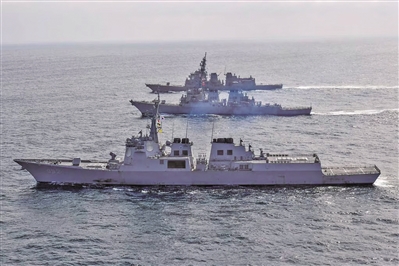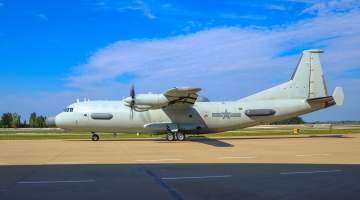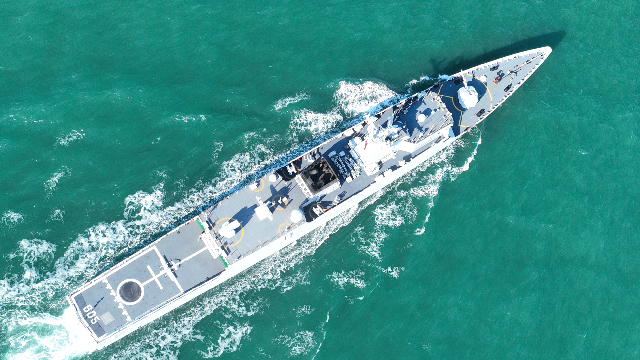
ROKS Yulgok Yi Idestroyer (bottom), USS Benfold destroyer (middle) and Japan's Atago-class destroyer (top) conduct joint anti-missile exercise on April 17.
By Zhang Chi
Recently, the US, Japan and ROK have continued to strengthen their trilateral military cooperation, citing the deterioration of the regional security situation and the need to respond to the threat from the Democratic People's Republic of Korea (DPRK) as excuses. In addition to conducting large-scale joint military exercises multiple times, they also announced the establishment of an intelligence cooperation agency, Three Eyes Alliance, to expand the scope of intelligence sharing. These measures will have a significant impact on the intelligence exchange and security situation in Asia.
ROK media reported on April 17 that the presidents of the US and ROK would sign a document on April 26 in Washington to strengthen bilateral cooperation in network security, establish a ROK-US intelligence alliance, and discuss the possibility of including Japan in the future to form a US-Japan-ROK alliance.
It is reported that the document to be signed by ROK President Yoon Suk-yeol and US President Joe Biden mainly includes measures to contain cyber adversaries, enhance the security of core infrastructure networks, and jointly address cybercrime, the essence of which is to expand the scope of intelligence sharing between the two countries. An official from the Office of the President of ROK said that the scope of intelligence sharing between the US and ROK would not be limited to just the field of network security but be expanded to include relevant intelligence fields concerning the DPRK and even Russia.
Kim Tae-hyo, first deputy director of the National Security Office of the ROK, said that the network intelligence shared between the US and ROK goes deeper than the Five Eyes Alliance, and the ROK-US intelligence alliance focusing on the Korean Peninsula will be even more solid. Some sources have also indicated that the US has strong capabilities in intelligence gathering. ROK's expansion of intelligence sharing with the US and the possible inclusion of Japan may develop into a Northeast Asian "Three Eyes" intelligence alliance in the future.
In addition, the US, Japan, and ROK have recently reached an agreement on the real-time sharing of DPRK missile warning information. Currently, the US and ROK, as well as the US and Japan, can share DPRK ballistic missile intelligence in real-time, but ROK and Japan cannot. The three countries have agreed to make full use of intelligence systems, including the US-Japan-ROK Trilateral Intelligence Sharing Agreement, to share missile warning information in real-time, and strengthen communication and cooperation between defense departments based on the ROK-Japan General Security of Military Information Agreement.
Yoon Suk-yeol's government has been striving to elevate the US-ROK relationship to the level of a global comprehensive strategic alliance, jointly plan the Asia-Pacific and global orders with the US, and expand and deepen the US-ROK cooperation in military and other fields based on the so-called "liberal democratic values". At the same time, Yoon has positioned improving ROK-Japan relations as a prioritized diplomatic objective, viewed common strategic goals and shared values as a basis for cooperation, and tried to build a future-oriented ROK-Japan cooperative relationship.
At the same time, the Biden administration has pursued an "alliance-first" foreign policy, and tried to bring ROK into its Indo-Pacific strategy orbit and make the Northeast Asia region the forefront of its comprehensive containment strategy by enhancing the alliance between the US and ROK. The increasing military cooperation between the US, Japan and ROK is a concrete manifestation of the three countries intensifying their efforts to construct a regional small circle. It is worth noting that the following issues remain difficult to circumvent in the future development of the alliance between the three countries.
On the one hand, it is difficult to improve the relationship between ROK and Japan. Among the trilateral relations between the US, Japan and ROK, the most fragile link is the relationship between ROK and Japan. It is widely believed that the recent easing of tensions in ROK-Japan relations was only superficial, and their mutual distrust and even hostility have been there for a long time. In order to break through the impasse in the relationship between the two countries, ROK and Japan held the 12th "2+2" ministerial-level foreign and security dialogue on April 17, which was met with opposition from opposition parties and citizens in ROK. ROK media generally believed that the improvement of ROK-Japan relations would face severe challenges against the backdrop of rising anti-Japanese sentiment and criticism of opposition parties.
On the other hand, the role conflicts in the US-ROK alliance are difficult to reconcile. The US has always regarded itself as a benefactor or even a master in the trilateral relations between the US, Japan and ROK. Although the Yoon Suk-yeol administration has a strong pro-American color, it is more inclined to increase ROK's autonomy in the alliance and realize the equal development of the US-ROK alliance. In particular, on the issue of the transfer of wartime operational command, which symbolizes military sovereignty, the Biden administration has currently responded flatly while ROK hopes to resolve it as soon as possible. In the future, it cannot be ruled out that the contradictions between the US and ROK on related issues will become more prominent.









